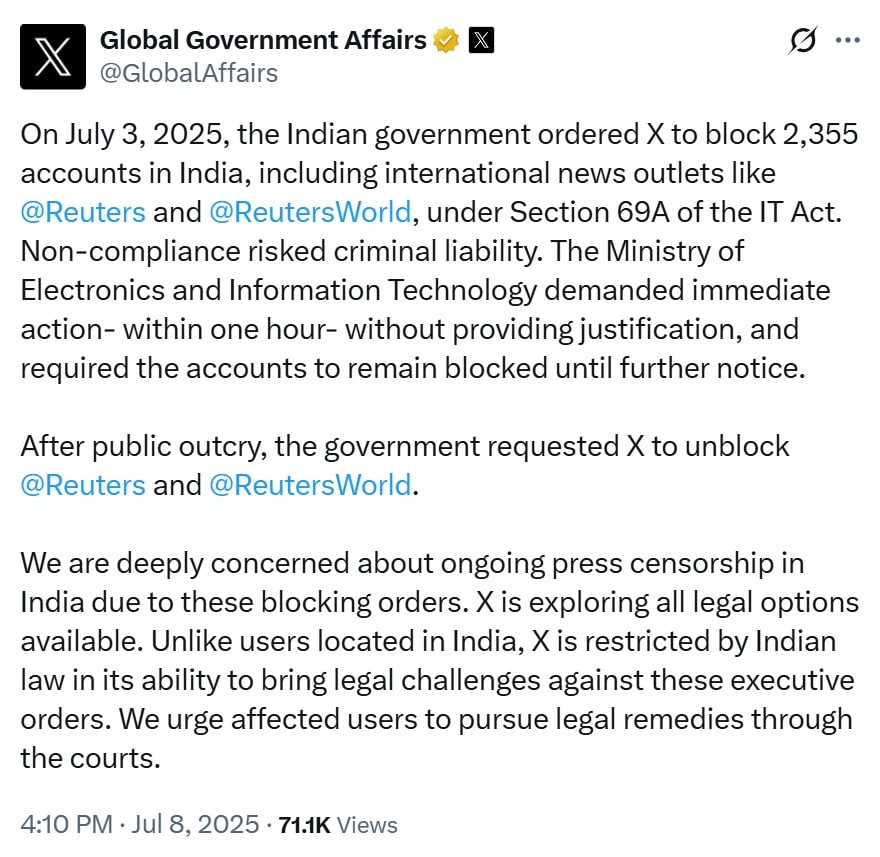Elon Musk's Xon Tuesday revealed that it received a government order from India on July 3 to block 2,355 accounts, including those linked to international media outlet Reuters.
According to the Global Government Affairs' post on X, the order came under Section 69A of the Information Technology Act, which allows the government to direct online platforms to remove content or block accounts in the interest of public order, sovereignty, or national security.
Government earlier denied any order on ReutersX’s statement directly contradicts the Indian government’s earlier claim. On Sunday, the Ministry of Electronics and Information Technology (MeitY) had said:
“There is no requirement from the Government of India to withhold Reuters handle.”
X, however, stated that it had received a formal blocking order, and had to comply within one hour, or face criminal liability, including penalties and possible jail terms for its local staff.
Reuters handles briefly withheld in IndiaOn Saturday night, users in India saw that the @Reuters and @ReutersWorld handles were inaccessible, with a message that they had been withheld due to a legal demand.
X confirmed this and added that it acted under legal pressure and later received a request from the Indian government to unblock the Reuters accounts after public backlash.
Censorship concerns raised by XX said it is 'deeply concerned about ongoing press censorship in India' and is exploring all legal options.
However, the platform explained that Indian laws limit its ability to challenge these executive orders in court. X urged affected users in India to seek legal remedies.
X has reportedly faced similar orders before. In May, during Operation Sindoor, the government had sent blocking orders targeting accounts that it said were spreading misinformation or undermining Indian military operations.
Government's stance during Operation SindoorAt the time of Operation Sindoor, a sensitive military mission undertaken after Pahalgam terror attack, the government had reportedly blocked several social media accounts, including those allegedly linked to Pakistan and China.
Some media outlets like BBC Urdu and Outlook India also saw their handles restricted briefly, though these bans were later reversed.
In a previous statement on May 9, X had disclosed that it received executive orders from the Indian government to block over 8,000 accounts, some of which belonged to well-known journalists and international media.
Tighter social media monitoring during conflictsSources in the IT Ministry reportedly say that during Operation Sindoor, a dedicated monitoring team, first created during the Lok Sabha elections, was put on round-the-clock duty. They were tasked with flagging and removing misleading content related to the military conflict.
The team received extra personnel to track content linked to national security concerns and possible foreign disinformation campaigns.
Legal battle and transparency concernsX continues to walk a tightrope between compliance and free speech, particularly in countries like India where executive orders are not made public.
While X says it wants to be transparent, it also faces legal restrictions under Indian law and risks heavy penalties or jail for non-compliance.
On July 3, 2025, the Indian government ordered X to block 2,355 accounts in India, including international news outlets like @Reuters and @ReutersWorld, under Section 69A of the IT Act. Non-compliance risked criminal liability. The Ministry of Electronics and Information…
— Global Government Affairs (@GlobalAffairs) July 8, 2025
The clash over the Reuters account reveals a growing concern over press freedom and transparency in government directives affecting news and information on social media.
X has said it is exploring the legal follow-ups and options available.
You may also like

'I've picked my 22 best Amazon Prime Day deals with the biggest savings I've seen all year'

CBSE releases supplementary admit card 2025 for private candidates at cbse.gov.in; check steps to download and more

Wimbledon star gets crowd reaction with mum comment as she eyes 45-year feat

As police remain mute witness, SFI activists barge into four Kerala universities

Macron kicks off State Visit to Britain to tackle bilateral, global challenges







